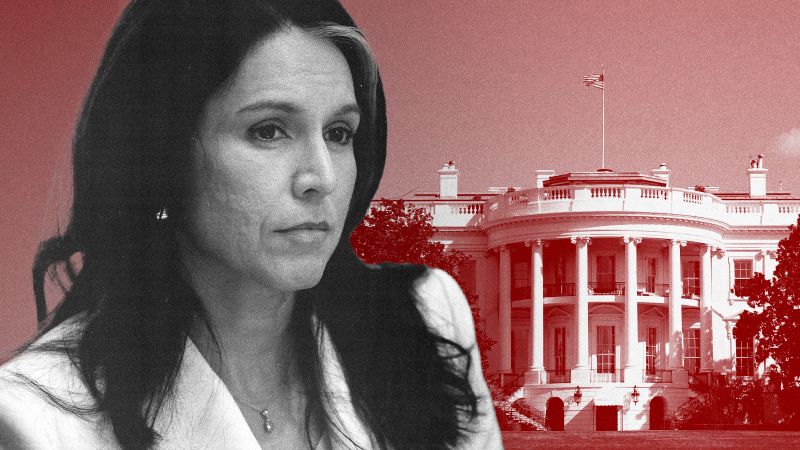In the darkened cabin of Air Force One late Monday night, President Donald Trump engaged with reporters amidst rising tensions surrounding the Israel-Iran conflict. Having hurriedly departed from the G7 meeting in Canada, the President was faced with inquiries about officials within his own administration, particularly concerning Tulsi Gabbard, the Director of National Intelligence. Her testimony before Congress in March conflicted with the prevailing narrative from Israel, where it was claimed that Iran was aggressively advancing towards a nuclear weapon. Gabbard had notably asserted that Iran was not actively pursuing such capabilities, a statement that, when put against Trump’s beliefs, ignited fierce discussion.
Responding to Gabbard’s testimony, President Trump dismissed her claims, stating succinctly, “I don’t care what she said. I think they were very close to having it,” thereby directly contradicting his intelligence director. This exchange was not merely a casual disagreement; it sent ripples of speculation throughout the conservative media landscape and raised questions regarding Gabbard’s future in the administration. Until recently, Trump reportedly appreciated Gabbard’s presence, believing in her potential to adapt and thrive within the complex structure of the White House, despite some skepticism from others about her capabilities.
Nevertheless, the dynamics seem to have shifted significantly. Sources indicate that within the West Wing, discontent has grown regarding Gabbard’s performance. Although she has been a key voice in advocating for Trump’s national security policies, her struggle to establish her authority within the Trump administration has become increasingly apparent. Insiders noted that Gabbard was perceived to be “off message,” especially concerning Middle Eastern policy, which has diminished her standing with the President.
Trump’s frustration reached a peak when Gabbard released a video in which she warned of a looming threat of nuclear conflict and critiqued the “political elite and warmongers” for escalating tensions. Trump interpreted her remarks as an implicit criticism of his policies towards Iran, particularly regarding his inclination to support military action by Israel. This sentiment resonated among many in the White House, who felt that Gabbard had overstepped her role.
Following the incident on Air Force One, both Gabbard and White House officials tried to downplay the seriousness of the exchange. Gabbard expressed to the media that she and Trump were aligned on the issue of Iran, while the White House’s rapid response team worked to portray the two statements as compatible. They maintained that just because Iran might not be actively developing a nuclear weapon at present does not negate the potential threat, as articulated by Trump.
Nonetheless, criticism was immediate and pervasive. Olivia Coleman, a spokesperson for the Office of the Director of National Intelligence, dismissed allegations of discord as a “lazy regurgitation” of misinformation. Gabbard, once a Democratic congresswoman known for her opposition to military interventions, has carved out a niche in Trump’s MAGA coalition, representing an image of loyalty to Trump and commitment to a vision free from the “deep state” influence she claims has plagued Washington.
Despite recent tensions, Gabbard has reported some successes in her tenure as DNI, including savings on contracts and streamlining operations within the intelligence community. Nevertheless, skepticism still lingers as to her understanding of the comprehensive operations of her role, which encompass oversight of the extensive network of U.S. intelligence agencies. Observers noted that Gabbard’s focus seemed more attuned to image management and less on the substantive leadership required for the position.
In the intelligence community, dissatisfaction with her approach is rife. Many employees feel that Gabbard prioritizes her public persona over actual governance, regularly featuring in media interviews and crafting a social media presence meant to align her with the ideals of the MAGA base while overlooking the essential duties of her role.
Moreover, her efforts have drawn scrutiny from both Democratic lawmakers and former intelligence officials who argue that Gabbard’s actions and focus on political objectives risk undermining the critical, unbiased functions of the intelligence community. The allegations of politicizing intelligence findings mean that her leadership approach is already under fire, with rising concerns regarding transparency and independence.
Despite such potential pitfalls, Gabbard maintains support within the White House, notably from Vice President JD Vance. However, it remains to be seen how her controversial standing among Trump’s inner circle will evolve, especially given the high stakes at play in international relations and the intricacies of U.S. intelligence operations. The complexities surrounding Gabbard’s role as DNI and the contrasting perceptions she invokes within the political sphere exemplify the contentious nature of governance in the current administration.
As Gabbard navigates her challenging trajectory, her allies assert that her commitment to restoring integrity to the intelligence community – albeit through a lens shaped by Trumpian politics – remains steadfast. The road ahead promises to be fraught with political strife as she balances the demands of her public role and the multifaceted responsibilities that come with it.



